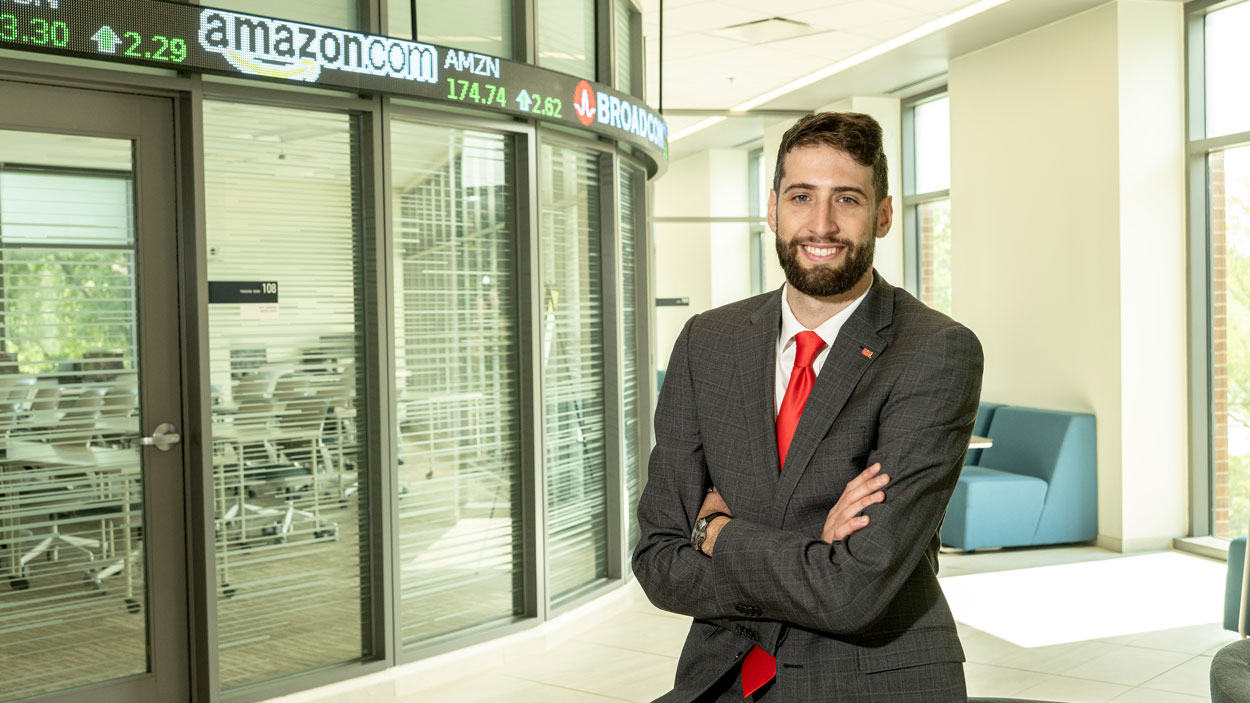
Dan Grossman, an assistant professor of marketing at UMSL, has consistently received rave reviews from students and colleagues for his approach to online teaching. (Photo by Derik Holtmann)
One of the many strengths of Dan Grossman’s research rests in its relatability and usefulness in everyday life. Grossman, an assistant professor of marketing at the University of Missouri–St. Louis, has long been fascinated with the psychology behind the decision-making processes of consumers and how their buying habits are impacted by those factors.
Grossman’s natural curiosity and the conversations that stem from those questions often lead to interesting research topics. One recent example is a paper Grossman co-published in Personality and Social Psychology Bulletin along with three colleagues at other universities titled “Self-Invitation Hesitation: How and Why People Fail to Ask to Join the Plans of Others.”
The research has been picked up by several national publications, including Discover Magazine, Psychology Today and PsyPost, and the findings have resonated on social media, too.
“It blew up a little bit on the Reddit psychology page and the Reddit science page, with a bunch of people saying, ‘Hey, here’s a paper that’s kind of different, but I can relate to it,” Grossman said.
The genesis of this paper dates back to Grossman’s childhood days.
He was friends with Julian Givi, but they lost touch when Givi moved away in elementary school. When Grossman was in his PhD program at the University of Cincinnati, he randomly bumped into Givi at an academic conference, and the long-lost friends found they were pursuing similar career paths. Givi, an associate professor of marketing at West Virginia University, published research on why people might be hesitant to say “no” when invited to an event, often overestimating negative ramifications for declining an invitation.
That sparked an informal conversation between the two friends, as they considered another element, which is why people are hesitant to ask if they can join the plans of others. That idea led to an official hypothesis and research plan and the addition of two more researchers – Colleen Kirk, a professor of management and marketing at New York Institute of Technology, and Constantine Sedikides, a professor in the psychology department at the University of Southhampton in the United Kingdom – to the project.
“What we found is potential self-inviters failed to ask to join the plans of others as often the plan-holders would prefer,” Grossman said. “Potential self-inviters, they overestimate how irritated plan-holders would be by such self-invitations, which itself kind of makes sense. But what we found, why they predicted this form of irritation might occur, was because these potential self-inviters exaggerate the likelihood that plan-holders had already considered inviting them but just decided against it, versus simply having made the plans without considering inviting them, which is much more likely.”
The group conducted eight experiments as part of their research, exploring both the perspectives of the plan-holders and the potential self-inviters. The researchers found that being placed in either role changed how the subjects viewed the situation.
“When we are the person making the plans, we know it’s a lot of work,” Grossman said. “We have to figure out how much it’s going to cost, how to get there, what we’re going to do. There are a lot of considerations that could make it easy to forget, ‘Hey, we should think about inviting that additional person.’ We know this when we’re making the plans ourselves, but we forget this when we’re not included in others’ plans. I think a lot of this has to do with the natural egocentric tendency that people have, which causes us to really overestimate how much people are always considering us, or how much they’re paying attention to us in general.”
Grossman and his colleagues have already discussed potential follow-up studies. Those could include a look at potential negative factors such as avoidance of rejection. Grossman said the general topic of the study – human interactions in a world where those are declining – will be important moving forward.
“The hope is this kind of research area takes off, not just this particular publication, but regarding invitations in general,” Grossman said. “Obviously rising loneliness is a problem, all that post-pandemic social awkwardness that makes people feel itchy and all these common and relatable social anxieties around just invitations in general. If this area kind of blows up a little bit, it’ll just make people’s lives a little bit easier. These social connections will happen a little bit more naturally. That’s my goal, with fingers crossed.”














